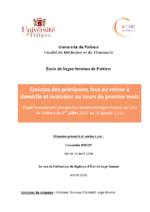Mémoire
Rhouy Cassandra
Craintes des primipares face au retour à domicile et évolution au cours du premier mois : étude transversale prospective monocentrique menée au CHU de Poitiers du 1er juillet 2017 au 31 janvier 2018
FrançaisConsulter le texte intégral (format PDF)

Résumé
Français
Craintes des primipares face au retour à domicile et évolution au cours du premier mois : étude transversale prospective monocentrique menée au CHU de Poitiers du 1er juillet 2017 au 31 janvier 2018
Introduction : La naissance d’un premier enfant crée de profonds bouleversements dans la vie familiale et apporte d’importantes responsabilités. La préparation à la sortie de la maternité doit donc être optimale. Nous avons voulu connaitre la proportion et l’évolution des craintes des primipares face au retour à domicile.
Matériel et méthodes : Une étude transversale prospective monocentrique a été réalisée au CHU de Poitiers. Un premier questionnaire a été distribué aux primipares à la maternité afin de quantifier et hiérarchiser leurs craintes. Un deuxième questionnaire leur a été envoyé un mois après leur accouchement pour évaluer le retour à domicile et la satisfaction du séjour à
la maternité.
Résultats : Les résultats ont montré que les trois premières craintes des femmes à la maternité étaient la séparation avec le nouveau-né au moment de la reprise du travail, le manque de temps pour soi et la reprise des rapports sexuels après l’accouchement. Un mois après le retour à domicile, le plus difficile pour les femmes était d’organiser leur temps (p = 0,005), gérer la reprise du travail (p = 0,029) et être bien entourée (p = 0,05). La durée moyenne du séjour à la maternité était de 3,9 jours et 86,5% (n = 83) des mères en étaient satisfaites.
Conclusion : L’étude a confirmé que la principale crainte des femmes concernait l’enfant, elles craignaient également la nouvelle organisation à adopter au retour à domicile. Avec la diminution de la durée du séjour à la maternité, un accompagnement à domicile était nécessaire afin d’aider les mères à prendre confiance en leur capacités.
Mots-clés libres : primipare, craintes, domicile, évolution, maternité, relais.
- Femmes primipares
English
Objectives : The birth of a first child creates profound upheavals in family life and brings important responsibilities. Preparation for leaving the maternity ward must therefore be optimal. We wanted to know the proportion and the evolution of the fears of the primiparous faced with returning home.
Patients and Method : A prospective monocentric cross-sectional study was performed in Poitiers Teaching Hospital. The first questionnaire was distributed to primiparous mothers to quantify and prioritize their fears. A second questionnaire was sent to them one month after delivery to evaluate the return home and the satisfaction of the maternity stay.
Results : The results showed that the first three fears of women while in the maternity ward were separation from the newborn when they would return to work, lack of time for themselves, and resumption of sexual intercourse after childbirth. One month after returning home, what was most difficult for women was organizing their time (p = 0,005), managing the return to work (p = 0,029) and being well supported at home (p = 0,05). The average length of stay in the maternity ward was 3,9 days and 86,5% (n = 83) of the mothers were satisfied.
Conclusion : The study confirmed that the main fear of women concerned the child, they also feared the new organization to adopt once they returned home. With the reduction in the length of stay in the maternity ward, help in the home was needed to help mothers gain confidence in their abilities.
Keywords : primiparous, fears, home, evolution, hospital maternity ward, relay.
Notice
- Diplôme :
- Diplôme état sage femme 5ème année
- Établissement de soutenance :
- Université de Poitiers
- UFR, institut ou école :
- UFR Médecine et Pharmacie
- Domaine de recherche :
- Maïeutique
- Directeur(s) du travail :
- Vanessa Poupard
- Date de soutenance :
- 05 juin 2018
- Président du jury :
- Julia Deparis
Menu :
-
-
à propos d'UPétille
-
Voir aussi
Annexe :

-
Une question ?
Avec le service Ubib.fr, posez votre question par chat à un bibliothécaire dans la fenêtre ci-dessous ou par messagerie électronique 7j/7 - 24h/24h, une réponse vous sera adressée sous 48h.
Accédez au formulaire...
Université de Poitiers - 15, rue de l'Hôtel Dieu - 86034 POITIERS Cedex - France - Tél : (33) (0)5 49 45 30 00 - Fax : (33) (0)5 49 45 30 50
petille@support.univ-poitiers.fr -
Crédits et mentions légales
